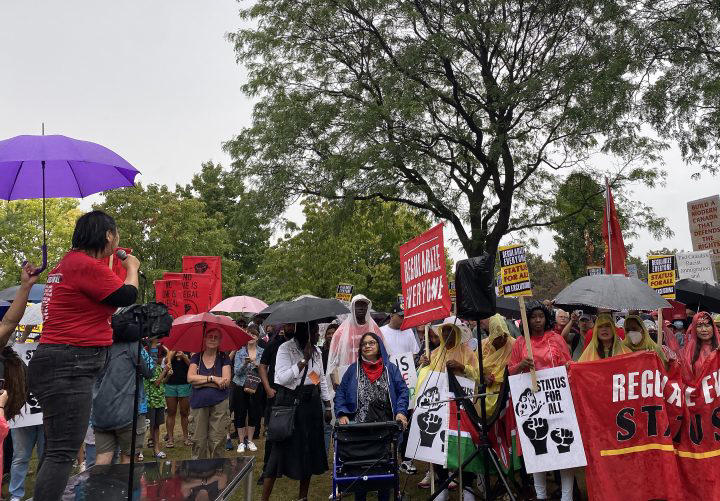End criminalization of undocumented migrants, UN envoy urges
Story by Uday Rana • Jun 30, 2023

People take part in a rally for migrant rights in Christie Pits park in Toronto on Sunday Sept. 18, 2022. Migrant rights groups are urging Canada to implement suggestions of a United Nations Special Rapporteur to “end the criminalization” of undocumented migrants.

People take part in a rally for migrant rights in Christie Pits park in Toronto on Sunday Sept. 18, 2022. Migrant rights groups are urging Canada to implement suggestions of a United Nations Special Rapporteur to “end the criminalization” of undocumented migrants.
© THE CANADIAN PRESS/Holly McKenzie-Sutter
Migrant rights groups in Canada are urging Prime Minister Justin Trudeau to implement the suggestions of a United Nations Special Rapporteur, who this week said countries should create regularization programs (pathways to permanent residency) for undocumented migrants.
“Regularization is a tool of protection and inclusion that benefits migrants, their families, destination countries and communities,” Felipe González Morales, UN Special Rapporteur on the human rights of migrants, told the Human Rights Council. “States must provide options for permanent residence, citizenship and meaningful participation of migrants in host societies.”
He urged governments across the world to “end the criminalization” of undocumented migrants.
The Migrant Rights Network, a migrant-led advocacy coalition based in Canada, welcomed the call.
“For decades now, undocumented migrants and their organizations have called for regularization as the single-most effective policy program to ensure rights and justice for undocumented migrants. Over 500 civil society organizations have joined us, now the United Nations is adding their voice; what more will it take for Prime Minister Trudeau to do the right thing?” asked Syed Hussan, Migrant Rights Network Secretariat.
“We call on Prime Minister Trudeau to ensure permanent resident status for all undocumented people, migrant workers, students and families without delay.”
González Morales, in a report released at the end of his tenure, noted that undocumented migrants are subject to discrimination, abuse and exploitation as a direct result of the lack of regular migration status. Regularization, he said, would improve their access to social protection, health care, decent work, education, adequate living conditions and family reunification.
Undocumented immigrants in Canada are typically people who arrived on temporary authorization such as a work or refugee claimant permit. Once the permit runs out, should the person decide to stay in Canada, they essentially become undocumented. An undocumented person loses access to many basic services.
Head of refugee advocacy group blasts SC decision on Safe Third Country Agreement: ‘The U.S. is not a safe country for refugees’
“Regularization processes must be accompanied by anti-discrimination policies to ensure the full enjoyment of their human rights,” González Morales said.
"I urge governments to end the criminalization of irregular migrants and promote solidarity and change the narrative on migration and combat xenophobia, racism and discrimination," he said.
The Migrant Rights Network estimated that as of October 2022, there were around 500,000 non-status people currently residing in Canada, many of whom live under very precarious circumstances.
“Without permanent resident status, undocumented people are unable to assert rights at work or access basic health care. They face discrimination and exploitation because of the well-founded fear of deportation. Non-status people are part of communities,” a report by the group read.
Migrant rights groups in Canada are urging Prime Minister Justin Trudeau to implement the suggestions of a United Nations Special Rapporteur, who this week said countries should create regularization programs (pathways to permanent residency) for undocumented migrants.
“Regularization is a tool of protection and inclusion that benefits migrants, their families, destination countries and communities,” Felipe González Morales, UN Special Rapporteur on the human rights of migrants, told the Human Rights Council. “States must provide options for permanent residence, citizenship and meaningful participation of migrants in host societies.”
He urged governments across the world to “end the criminalization” of undocumented migrants.
The Migrant Rights Network, a migrant-led advocacy coalition based in Canada, welcomed the call.
“For decades now, undocumented migrants and their organizations have called for regularization as the single-most effective policy program to ensure rights and justice for undocumented migrants. Over 500 civil society organizations have joined us, now the United Nations is adding their voice; what more will it take for Prime Minister Trudeau to do the right thing?” asked Syed Hussan, Migrant Rights Network Secretariat.
“We call on Prime Minister Trudeau to ensure permanent resident status for all undocumented people, migrant workers, students and families without delay.”
González Morales, in a report released at the end of his tenure, noted that undocumented migrants are subject to discrimination, abuse and exploitation as a direct result of the lack of regular migration status. Regularization, he said, would improve their access to social protection, health care, decent work, education, adequate living conditions and family reunification.
Undocumented immigrants in Canada are typically people who arrived on temporary authorization such as a work or refugee claimant permit. Once the permit runs out, should the person decide to stay in Canada, they essentially become undocumented. An undocumented person loses access to many basic services.
Head of refugee advocacy group blasts SC decision on Safe Third Country Agreement: ‘The U.S. is not a safe country for refugees’
“Regularization processes must be accompanied by anti-discrimination policies to ensure the full enjoyment of their human rights,” González Morales said.
"I urge governments to end the criminalization of irregular migrants and promote solidarity and change the narrative on migration and combat xenophobia, racism and discrimination," he said.
The Migrant Rights Network estimated that as of October 2022, there were around 500,000 non-status people currently residing in Canada, many of whom live under very precarious circumstances.
“Without permanent resident status, undocumented people are unable to assert rights at work or access basic health care. They face discrimination and exploitation because of the well-founded fear of deportation. Non-status people are part of communities,” a report by the group read.

No comments:
Post a Comment